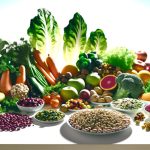Pea Protein
Pea protein is a plant-based protein source that is derived from yellow peas. It is a popular alternative to animal-based protein sources for vegans and vegetarians, as well as for those who are lactose intolerant or have allergies to soy or whey protein.
The history of pea protein dates back to the early 1900s, when it was first used as a food ingredient in Europe. However, it wasn’t until the 1990s that pea protein began to gain widespread popularity as a dietary supplement. This was due in part to the growing interest in plant-based diets and the increasing demand for alternative protein sources.
Pea protein is a complete protein, meaning it contains all of the essential amino acids that the body needs to function properly. It is also a good source of iron, potassium, and other minerals. Pea protein is also low in fat and cholesterol, making it a healthy option for those looking to maintain a healthy diet.
Advantages of Pea Protein
One of the main advantages of pea protein is that it is a complete protein, meaning it contains all of the essential amino acids that the body needs to function properly. Essential amino acids are the building blocks of proteins and are vital for maintaining and repairing tissues, such as muscles and bones. Pea protein is particularly rich in the amino acids lysine, arginine, and leucine, which are important for muscle growth and recovery.
Another advantage of pea protein is that it is a good source of iron, potassium, and other minerals. Iron is essential for the production of red blood cells and the transport of oxygen throughout the body. Potassium is important for maintaining proper fluid balance and supporting healthy blood pressure. Additionally, pea protein is low in fat and cholesterol, making it a healthy option for those looking to maintain a healthy diet.
Pea protein is also highly soluble, which means it can be easily mixed into liquids and other foods. This makes it a versatile ingredient that can be used in a variety of different products, including protein powders, bars, and even baked goods. This makes it a convenient option for those who are looking to add more protein to their diet, but don’t have time to prepare and cook meals.
Pea protein is also an excellent option for those with allergies or sensitivities to other protein sources. For example, many people are allergic to dairy-based proteins like whey and casein, and soy-based proteins can cause digestive issues for some people. Pea protein is hypoallergenic and easy to digest, making it a safe option for those with allergies or sensitivities.
Pea protein is also more sustainable than animal-based protein sources. The production of animal-based protein requires large amounts of land, water, and other resources, and can contribute to deforestation and other environmental issues. Pea protein, on the other hand, is produced using significantly fewer resources, and can be grown using sustainable farming practices.
In addition, pea protein is also a good source of antioxidants, which are compounds that help to protect the body from damage caused by free radicals. Free radicals are molecules that can cause damage to cells, leading to inflammation and other health problems. Antioxidants can help to neutralize free radicals, which can help to reduce the risk of chronic diseases.
Disadvantages of Pea Protein
Despite its many benefits, there are also some drawbacks to using pea protein as a vegan protein source. One of the main drawbacks is that pea protein is not as well absorbed by the body as animal-based protein sources. This can make it less effective at building and maintaining muscle mass, especially for those who are highly active or involved in intense physical activity.
Another drawback to pea protein is that it can have a strong, earthy flavor that some people find unappealing. This can make it less appealing as a standalone protein source, and may require the use of flavorings or sweeteners to make it more palatable.
Another issue with pea protein is that it is not always a good source of branch chain amino acids (BCAA). BCAA are a group of three essential amino acids that are critical for muscle growth and recovery. Animal-based proteins like whey and casein are generally considered to be better sources of BCAA than pea protein, which is relatively low in these essential amino acids.
Summary
Pea protein is a plant-based protein source that is derived from yellow peas. It is a popular alternative to animal-based protein sources for vegans and vegetarians, as well as for those who are lactose intolerant or have allergies to soy or whey protein. Pea protein is a complete protein and a good source of iron, potassium, and other minerals. However, it does have its drawbacks such as lower bioavailability, strong flavor, lack of BCAA, and higher cost compare to other plant-based protein sources. It offers numerous advantages over animal-based protein sources. It is a complete protein that is rich in essential amino acids, minerals, and antioxidants. Pea protein is also highly soluble, making it easy to mix into liquids and other foods. Additionally, it is a good option for those with allergies or sensitivities to other protein sources, easy to digest, and more sustainable. Pea protein is a great alternative to traditional animal-based protein sources and can be an excellent addition to a healthy diet.
Frequently Asked Questions
What is pea protein and where does it come from?
Pea protein is a plant-based protein source that is derived from yellow peas. It is a popular alternative to animal-based protein sources for vegans and vegetarians, as well as for those who are lactose intolerant or have allergies to soy or whey protein.
Is pea protein a complete protein?
Yes, pea protein is a complete protein, meaning it contains all of the essential amino acids that the body needs to function properly.
Can pea protein be used by athletes and bodybuilders?
While pea protein can be used by athletes and bodybuilders, it may not be as effective as animal-based protein sources in building and maintaining muscle mass, especially for those who are highly active or involved in intense physical activity.
Does pea protein have a strong taste?
Some people find that pea protein has a strong, earthy flavor that can be unappealing. This can make it less appealing as a standalone protein source, and may require the use of flavorings or sweeteners to make it more palatable.
Is pea protein more expensive than other plant-based protein sources?
Pea protein can be more expensive than other plant-based protein sources such as soy or rice protein. This can be a significant drawback for those on a tight budget or who are looking for a more affordable alternative to animal-based protein sources.
Is pea protein good for people with allergies or sensitivities?
Pea protein is hypoallergenic and easy to digest, making it a safe option for those with allergies or sensitivities to other protein sources such as dairy and soy.
How does pea protein compare to animal-based protein sources in terms of sustainability?
The production of animal-based protein requires large amounts of land, water, and other resources, and can contribute to deforestation and other environmental issues. Pea protein, on the other hand, is produced using significantly fewer resources, and can be grown using sustainable farming practices, making it a more sustainable option.









